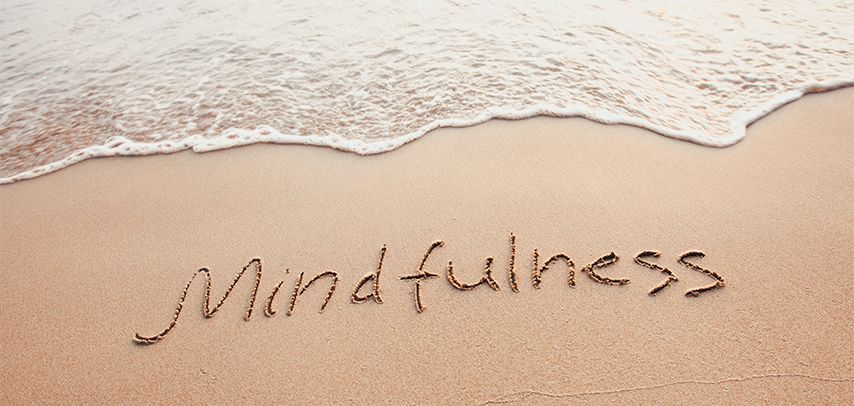Many of us experience stress from our daily routine, circumstances beyond our control or news we receive, and we struggle to calm our mind down.
While we juggle handling chores, catching up with meetings, planning for meals, making summer vacation plans, solving our children’s problems, dealing with disappointments, scheduling doctor’s appointments, shopping for groceries, organizing birthday parties or arranging payments we need to make, our minds get rapidly tangled. However, we need to pay the same amount of attention to our mental health as we do to our physical health, and understand that the body, soul and mind operate as one.
The same way we exercise to keep our body healthy and pay attention to what we eat, there are also things we can do to keep our minds, which are tossed around from one idea to the other throughout the day, healthy, like Yoga, meditation and hobbies, to name a few. Mindfulness, which takes on a comprehensive and holistic point of view, encompasses all these activities and allows us to be aware of each moment.
The idea of mindfulness stems from the Eastern philosophy. It found its place in the Western world beginning in the Sixties and was packaged into theory by Jon Kabat Zinn, a medical doctor, in the Seventies. This article will give you details on the many aspects of mindfulness.
What is Mindfulness?
In its most common and simplest definition, mindfulness is purposeful attention to the present moment, without making any judgements. For example, eating your meal without checking your phone or seeing what’s on the TV and focusing only on your eating is practicing mindfulness.
This active attention allows you to observe your ideas and thoughts without judgement and helps you focus on whatever you are doing at that moment. When you are “in the present moment”, you can calmly observe what’s happening inside you and around you without feeling overwhelmed, act without overreacting, and stay loyal to your fundemantal values. “Conscious awareness” or “mindfulness” is a practice that everyone can apply but needs practice to internalize.

What are the Contributions of Mindfulness to Daily Living?
- Mindfulness helps restore mental stability and reduces stress and anxiety.
- A mindfulness practice, meditation, can help strengthen your immune system.
- Regular mindfulness practices have been shown to increase the grey matter in the brain, which is involved in memory, learning, empathy and emotional control.
- Mindful eating practices help you to detect satiety signals, enjoy meals and prevent overeating. In time, it helps you to make healthier dietary choices.
- Mindfulness trainings have been shown to increase concentration abilities and attention span and to improve memory.
- Minfulness can help you decrease your emotional response and regulate your feelings.
- Regular mindfulness practice also increases your empathy capacity, and makes you more fair and kind to yourself.
- Mindfulness improves positivity, tolerance towards differences, and patience and forgiveness in your relationship with your partner and children.
- It helps decrease anxiety and stress during pregnancy.
- Research shows that mindfulness can reduce symptoms related to post-traumatic stress disorder and other stress disorders.
- Mindfulness-based meditation practice can help you improve your attention span and sleeping patterns and prevent exhaustion.
What is Awareness and Conscious Awareness?
Although our perception and our ability to grasp what’s happening around us can be high, “awareness” and “conscious awareness” are concepts that are different and complement each other.
Awareness is related to perception. It helps us realize that we are part of everything that surrounds us. Conscious awareness, on the other hand, requires more instrospection and thought. Conscious awareness goes beyond just being and experiencing the present. It involves accepting all emotional experiences, not only peace and happiness but also anger and sadness, without judgment and utilizes all these experiences to understand ourselves better.

What is a Mindfulness Exercise?
Mindfulness is a practice you can use in all areas of life. It is actually a skill that we naturally know but have forgatten to use, and mindfulness exercises are basically things we need to do to remember how to use this skill, make it part of our daily lives, or in our words, ‘strengthen our mindfulness muscles’.
There are many centers that can train you in mindfulness. To make mindfulness a part of your daily life and to figure out which mindfulness exercise is the best for you, you can visit these centers or work with psychologists that provide mindfulness-focused therapy.
What are the Types of Mindfulness Exercises?
Mindfulness exercises can be divided into formal and informal types of exercises.
Formal exercises are those that you need to practice everyday, as suggested by the training you receive. Typically, these exercises involve focusing on breathing, thinking and the senses , or they can be exercises that are enriched by mindfulness meditations.
Mindfulness exercises that focus on breathing aim to help you know and control your breathing better. They teach you to breathe in a natural way, in a manner corresponing to the things that happen around you or the ideas that float through your mind.
Minfulness exercises that focus on the senses have been developed to give you a conscious awareness of all the senses in your body. These sensory exercises involve focusing on and experiencing the effects of everything you see, touch, hear, taste or smell.
The exercises that focus on ideas and emotions teach you to pay attention to how your consciouness and thought processes are affected by your sensory experiences or breathing, and they train you to let all ideas and emotions, including stress, to flow through your mind.
Informal exercises aim to make mindfulness exercises part of your daily routine, and they are shaped by your personal choices and creativity. You can practice these exercises any time and any place, for instance, when you are commuting to work, when you are spending time with your children or when you are walking or exercising.

How Can We Incorporate Mindfulness Exercises into Our Daily Lives?
Set aside a special time for a mindfulness exercise every day, even if it is brief.
Choose an activity or a simple task that you would like to accomplish by focusing all your attention on the activity or task. It could be going on a walk, laying with your eyes closed, or brushing your teeth or your hair with your left hand, if you are right-handed. When you are driving to work, you can turn off the music and only focus on driving and the things you see on the road.
Place your judgements aside
Judging is a natural tendency, and it is not possible to stop our mind from making judgements. However, it is possible to let judgements flow through your mind without feeding them any further or letting them take over your thought stream.
Stay in the Moment
Focus completely on what you are doing. During this experience, use all your senses and try to express what you see, hear, smell or feel using words. Concepts we hear often, like “being in the present” or “going with the flow”, are very important. Being able to stay in the present moment would allow you to be aware of all the distracting and negative thoughts you have, and instead of running way from them, you would let them flow through you without being stuck in them or getting into conflicts with them.
Be Patient
Remember that your goal is not to stop your mind from wandering from one thing to the next. Your mind will naturally wander, but you should remain calm and be kind to yourself. When you realize that you are really lost in thought, remind yourself that you are focusing on staying in the moment, and that you are not thinking about what to cook for dinner.
Breathe Carefully
During mindfulness or meditation exercises, you can focus on your breathing. In this practice, you can use your senses to concentrate on how you breathe, and if you realize that your mind is wandering off, try to focus back on your breathing.
What are the Benefits of Mindfulness Meditation?
Mindfulness is not a type of meditation but rather, a lifestyle. Mindfulness meditation can be described as a method for developing awareness by focusing on breathing, the senses or the emotions. This type of meditation brings your attention back to your breathing, the sounds around you or to the changes in your body when the mind wanders off.
Mindfulness exercises and regular mindfulness meditation have been scientifically proven to improve concentration, strenghten the immune system, decrease stress levels, increase sleep quality, decrease the effects of old age, and help with weight loss and coping with negative feelings.

Who Can Be Trained in Mindfulness?
Mindfulness is a practice that people of all ages, genders and professional backgrounds can benefit from and apply in their lives. It is particularly useful for people who have trouble regulating their emotions, act impulsively, have experienced trauma or have healed from substance abuse disorder. If you or a loved one have difficulty managing stress, emotions or negative thoughts, mindfulness can be a great tool to decrease stress.
Do Not Wait to Start Mindfulness Training!
Do Not Wait to Start Mindfulness Training! As an Âlâ Banking customer, you can start your mindfulness journey now, with advantages created just for you. You can benefit from various trainings and workshops offered by Renaissance Consulting, at 30% off for Âlâ Banking customers, and take that important first step to incorporating “conscious awareness” skills into your life.
Misconceptions about Mindfulness
- Although mindfulness is a practice based on Eastern philosophy, it is not a religion. It does not conflict with your beliefs.
- Mindfulness practices do not involve special rituals. Anyone can practice it easily.
- Mindfulness is not a type of meditation, but rather, a practice that helps you meditate with an attention-based focus.
- Mindfulness is not an affirmation exercise. It focuses on looking at things without judgement and as they are.
- Mindfulness does not have a mystical element. On the contrary, it has been integrated into Western thought, scientific studies have ben conducted on it and it is used as a psychological therapy method.
You May Be Also Interested